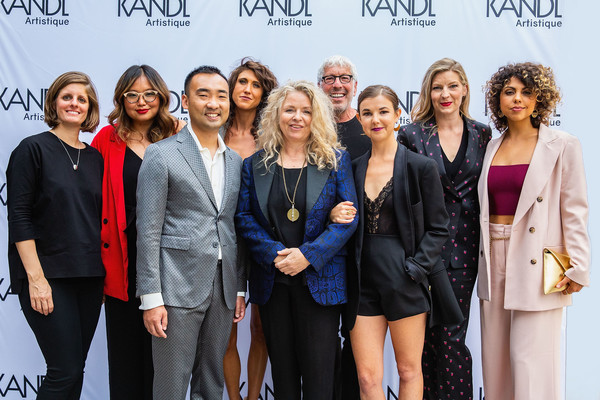Patricia Rozema’s ‘Mouthpiece’ follows a thirty-year-old Toronto woman for a short time, from the death of her mother to the funeral and eulogy. Cassandra’s in a tough place, trying to reconcile a lifetime with her mother and feel her feelings while organising the funeral and reception. It’s the universal story of primal loss, given bold new life through a unique storytelling device, based on the stage play by Amy Nostbakken and Norah Sadava. They reprise their roles in the film, both playing Cassandra simultaneously. We spoke with Rozema about this unique approach and about the universal pain of loss.
[youtube url=”https://www.youtube.com/watch?v=D_fGqSgTNmk” width=”500″ height=”300″]
The loss of our mothers is the worst pain. There’s self-awareness and catharsis and emotion but your film is completely unsentimental. How did you avoid it?
That’s a great compliment, thank you. There’s nothing suckier or mushier than dear old mom movies with all that sentiment and those greeting cards. I think part of the process that helps guard against sentiment is reality. Always draw from life, not from other art, which is what Amy and Nora clearly did in the play. I was excited to be working with them. Everything in the movie happened to one of us. I brought, new things that weren’t in it, there was no character of the mother in the play, no Christmas party or sex scene, there were lots we brought to make it a movie. We drew from life, not art. Lives are much messier than what we see.
I will also say that I grew up in a northern European Dutch family not known for being gushy or sentimental and Calvinist to boot. They were hard-working immigrants so there was nothing sentimental about my upbringing, so I am drawn to more sober art. But I’m really emotional which puts me at odds with my environment and there’s the gay conflict. I loved Ingmar Bergman, really engaged with his art. I wasn’t allowed to see movies; it was a different landscape with not one movie theatre. I didn’t know about them. I hardly saw television, my father called it the “idiot box”. In my late teens, a boyfriend took me to a Bergman double bill and I thought this speaks to me. There was power and gravity and austerity. But I joke more in my films than Bergman.

Producers Christina Piovesan and Jennifer Shin, owner of KANDL Artistique William Cheng, actress Amy Nostbakken, director Patricia Rozema, producer Niv Fichman, and actresses Norah Sadav, Maev Beaty, and Jess Salgueiro pose for a photo at KANDL Artistique on September 6, 2018 in Toronto, Canada. (Sept. 5, 2018 – Source: Suzi Pratt/Getty Images North America)
Cassandra is us, it’s hard not to see ourselves in her, young, suddenly forced to grow up and solve problems. It’s a big deal.
The play is radically different. Norah and Amy, they say it hardly bears comparison. They stood on a stage in two white bathing suits and one white bathtub and sang songs, had dialogue, did satirical imitations of other people. There was no eulogy, it’s so very different. The play was really in your face and angrier. I’m not as angry as they were when they wrote it. Ours has more grief, tenderness. There’s also more love towards the mother because I am one. I love that everyone comes out of the theatre and says “I just wanted to call mother”. When my mother died, I remember it hitting me in the walk up to the front of the church. My father was dying while we were shooting. My mother died when I was in my early thirties like Cassandra.
Because the Cassandras were one person, they move in synch, or complete the other’s action, and react to one other. The girls knew the choreography as they wrote it, but was it challenging for you?
[youtube url=”https://www.youtube.com/watch?v=ILvNjYJo-G0″ width=”500″ height=”300″]
They did it in the play. Their brilliant idea. Two people play one character. It’s so original and true to the sensations I had going through it. I remember in Mansfield Park (Rozema, 1999) I had a little moment where everyone, ten people slip into synchronicity all at once, clearly, it was a gesture, a movement.
I don’t think this has ever been done in a film before.
The closest thing is in Luis Buñuel’s The Discreet Charm of the Bourgeoisie, out of necessity when two different women play one character, but not at the same time.
Were Amy and Norah familiar with your incredible body of work?
They weren’t when we met, they heard of me, but hadn’t seen anything I’d done, they were pleased, but it wasn’t an informed pleasure. They like I’ve Heard the Mermaids Sing a lot. I don’t know what else they’ve seen. I don’t need accolades.
It occurred to me that this would be a totally different story if it were about the loss of our fathers.
I think it has been that way, it should be that way. Some men aren’t as involved in the raising, but if they are, it might be as primal. That’s the quote I was so keen to have in the movie from Ruth Bader Ginsberg “Women will not have equality until men share in the raising of the next generation”. It touches on so many things, the primal connection in that we come from their bodies, but after the nursing, I do think the connection with the father can be as profound. I have two daughters one I gave birth to and one I didn’t. If anyone means I loved one less, I would have to cut off their head!
Interview by @annebrodie, BFCA BTJA AWFJ TFCA FIPRESCI